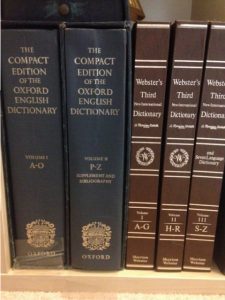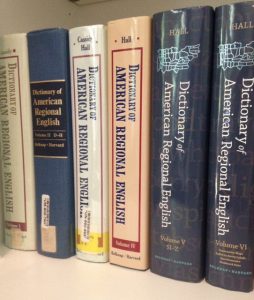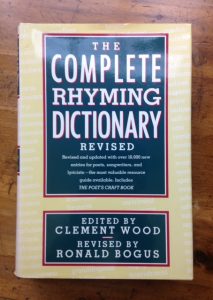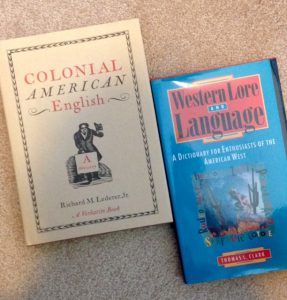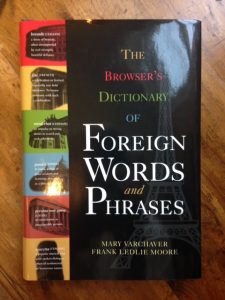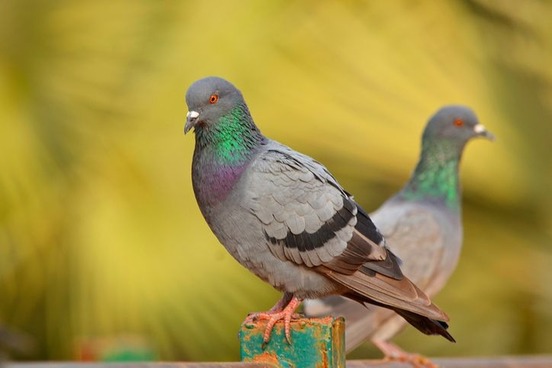
I once said that if I were stranded on a desert island with only one book, I’d want it to be the Oxford English Dictionary. Given that this is hypothetical, I’d define the entire 20 volumes as one book. Alas, I have only the condensed version at home.
Reasons I Love Dictionaries: Lots of Information
The joy of big, encyclopedic dictionaries such as the OED and the Dictionary of American Regional English—dictionaries too big to fit in one volume—is that they give you so much information: multiple meanings, pronunciation, origin(s), where and when it was used. They give you archaic words and highly specialized ones. Often they include examples of the usage, past and/or present. Altogether good reads.
Reasons I Love Dictionaries: Specialized Topics
At the other end of the spectrum are dictionaries that cover very narrow or specialized topics, such as a medical dictionary, or dictionaries devoted to lust, wrath, body parts, or texting.
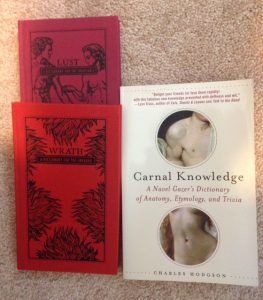
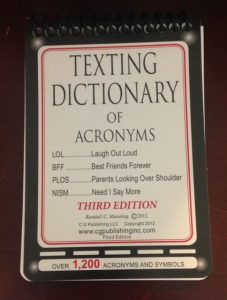
Reasons I Love Dictionaries: Passions
There are dictionaries that help one follow one’s passions. Everyone knows about cross-word puzzle dictionaries. Rhyming dictionaries fall into this category as well.
Reasons I Love Dictionaries: Subcultures
I own several dictionaries acquired for writing authentically about specific subcultures.
Reasons I Love Dictionaries: Time Periods
Some cover only certain regions of the country or time periods.
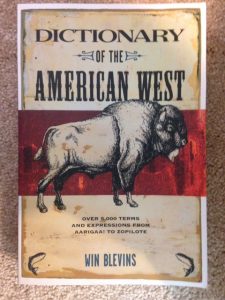
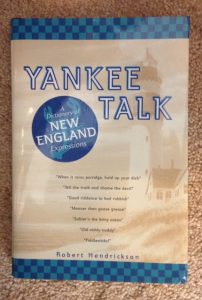
Reasons I Love Dictionaries: Regions
Not all English is created equal. You might remember the line sung by Professor Higgins in My Fair Lady:
There even are places where English completely disappears. Why, in America, they haven’t used it for years!
So it’s no surprise that there are various versions of the Oxford English Dictionary, including the Oxford Dictionary of American English. Given the breadth of the British Empire, it’s no wonder that there are dictionaries such as this one.
Reasons I Love Dictionaries: Age & Decade
As a writer, some specialized dictionaries are helpful, for example, when writing about children or when wanting to use slang appropriate to the age or year.


Reasons I Love Dictionaries: What’s That Word Again?
There are even dictionaries for people who know what they are looking for but don’t know the word for it!

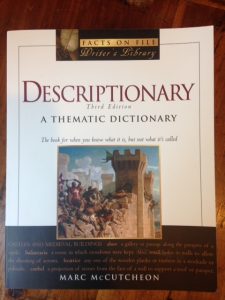
Reasons I Love Dictionaries: Foreign Words in English Usage
I enjoy The Browsers Dictionary of Foreign Words and Phrases. For one thing, it points out words that are in such common use that one forgets they are foreign! Words like operetta and wanderlust.
Reasons I Love Dictionaries: Slang
But my all-time favorites for fun reading are the books of slang. They are full of colorful and often funny usages, and they come in both specialized and generalized forms.

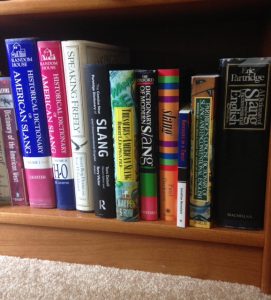
Tip for Writers
Open any dictionary at random, close your eyes, put your finger on a word, and write it down. Repeat 3-5 times. Write a sentence, paragraph, scene, or story that uses all of those words appropriately.
Takeaway for Writers and Readers
Find your perfect dictionary and enjoy a good read!
- Top Definitions
- Synonyms
- Quiz
- Related Content
- More About Love
- When To Use
- Examples
- British
- Idioms And Phrases
This shows grade level based on the word’s complexity.
This shows grade level based on the word’s complexity.
noun
a profoundly tender, passionate affection for another person.
a feeling of warm personal attachment or deep affection, as for a parent, child, or friend.
sexual passion or desire.
a person toward whom love is felt; beloved person; sweetheart.
(used as a term of endearment, affection, or the like): Would you like to see a movie, love?
Love, a personification of sexual affection, as Eros or Cupid.
affectionate concern for the well-being of others: the love of one’s neighbor.
strong predilection, enthusiasm, or liking for anything: her love of books.
the object or thing so liked: The theater was her great love.
the benevolent affection of God for His creatures, or the reverent affection due from them to God.
Chiefly Tennis. a score of zero; nothing.
a word formerly used in communications to represent the letter L.
verb (used with object), loved, lov·ing.
to have love or affection for: All her students love her.
to have a profoundly tender, passionate affection for (another person).
to have a strong liking for; take great pleasure in: to love music.
to need or require; benefit greatly from: Plants love sunlight.
to embrace and kiss (someone), as a lover.
to have sexual intercourse with.
verb (used without object), loved, lov·ing.
to have love or affection for another person; be in love.
Verb Phrases
love up, to hug and cuddle: She loves him up every chance she gets.
VIDEO FOR LOVE
QUIZ
CAN YOU ANSWER THESE COMMON GRAMMAR DEBATES?
There are grammar debates that never die; and the ones highlighted in the questions in this quiz are sure to rile everyone up once again. Do you know how to answer the questions that cause some of the greatest grammar debates?
Which sentence is correct?
Idioms about love
- out of affection or liking; for pleasure.
- without compensation: He volunteered at the animal shelter for love.
for love,
for the love of, in consideration of; for the sake of: For the love of mercy, stop that noise.
- to embrace and kiss as lovers.
- to engage in sexual activity.
in love, infused with or feeling deep affection or passion: a youth always in love.
in love with, feeling deep affection or passion for (a person, idea, occupation, etc.); enamored of: in love with the girl next door;in love with one’s work.
make love,
no love lost, dislike; animosity: There was no love lost between the two brothers.
Origin of love
First recorded before 900; Middle English noun love, louve, luve, Old English lufu, cognate with Old Frisian luve, Old High German luba, Gothic lubō; verb derived from the noun; akin to Latin lubēre (later libēre ) “to be pleasing,” Slavic (Polish ) lubić “to like, enjoy,” see also lief
OTHER WORDS FROM love
outlove, verb (used with object), out·loved, out·lov·ing.o·ver·love, verb, o·ver·loved, o·ver·lov·ing.
Words nearby love
Louÿs, lovable, lovage, lovastatin, lovat, love, loveable, love affair, love apple, love arrows, love at first sight
Dictionary.com Unabridged
Based on the Random House Unabridged Dictionary, © Random House, Inc. 2023
MORE ABOUT LOVE
What is a basic definition of love?
Love is an intense, deep affection for another person. Love also means to feel this intense affection for someone. Love can also refer to a strong like for something or to like something a lot. Love has many other senses both as a verb and a noun.
It is difficult to explain what love is. Love is one of the most intense emotions humans feel in life. It is the opposite of hate, another incredibly intense emotion. When you would do anything for a specific person, that’s usually because you feel love for them.
There are many kinds of deep affection you can have for another person, and they can all be described as love. The love you feel for your parents won’t be the same love you feel for a close friend or a romantic partner. You can also have a strong emotional bond with an animal, such as your dog. That, too, is love.
- Real-life examples: Spouses hopefully feel love toward each other. It is expected that a parent will have feelings of love for their child. Valentine’s Day is a celebration of love.
- Used in a sentence: The man always helped his daughter out of love for her.
Love is used in this same sense to mean to feel love toward another person. People who romantically love each other are said to be “in love” and are called lovers. These terms generally imply romantic or sexual attraction.
- Real-life examples: Romeo loved Juliet. Most parents love their children. A person often loves their boyfriend or girlfriend.
- Used in a sentence: She loves her best friend like a sister.
Love is also used to refer to a less passionate, but still strong, fondness for something.
- Real-life examples: Athletes have a love of sports. Readers have a love of books. Artists may have a love of painting, music, or drawing.
- Used in a sentence: His love of Paris led him to take many trips to France.
In this sense, love can also be used to mean to really like something or someone. The word lover is used to mean a person who really likes something, as in a “dog lover” or a “food lover.”
- Real-life examples: Cats love to chase things. Outgoing people love being around other people. Couch potatoes love television.
- Used in a sentence: I love going to the zoo and seeing all the animals.
Where does love come from?
The first records of love come from before the 900s. The noun comes from the Old English word lufu, and the verb comes from the Old English lufian. Both of these words are related to older words for love, such as the Old Frisian luve and luvia.
Did you know … ?
How is love used in real life?
Love is a very common word that people use to refer to others that they cherish or to things they really like.
I love my sister so much she’s my best friend 💕💞💘💓💗
— LV (@_lovee_lupe) November 25, 2020
I like how my friends send me random cat memes because they know how much I love cats❤️
— please tell me to go study (@mutale019) November 25, 2020
“I sustain myself with the love of family.” #MayaAngelou
— Maya Angelou (@DrMayaAngelou) November 29, 2020
Try using love!
Which of the following words is NOT a synonym of love?
A. affection
B. infatuation
C. desire
D. hate
WHEN TO USE
What are other ways to say love?
The noun love refers to a profoundly tender, passionate affection for another person. When should you use love in place of affection or devotion? Find out on Thesaurus.com.
Words related to love
affection, appreciation, devotion, emotion, fondness, friendship, infatuation, lust, passion, respect, tenderness, yearning, lover, admire, care for, cherish, choose, go for, prefer, prize
How to use love in a sentence
-
Every now and again, we come across a love story that touches our hearts in more ways than be.
-
Again, I didn’t think much of it as a 15-year-old, but I just had a love for food.
-
Ideally you should be growing and evolving at similar rates and speeds for romantic love, I should say.
-
She’d met me in 1986, at a party for returned Peace Corps volunteers and had fallen in love with the guy who’d just spent two years teaching in Swaziland.
-
To be a real home cook, the kind who put love and attention into each dish, was to make everything yourself.
-
What happened to true love knows no boundaries and all that?
-
“I love my job and I love my city and I am committed to the work here,” he said in a statement.
-
And we have a lot of great guests this season: Greta Gerwig, Natasha Lyonne, Olivia Wilde, Steve Buscemi is back—I love that guy.
-
You just travel light with carry-on luggage, go to cities that you love, and get to hang out with all your friends.
-
Terrorism is bad news anywhere, but especially rough on Odessa, where the city motto seems to be “make love, not war.”
-
In this case, I suspect, there was co-operant a strongly marked childish characteristic, the love of producing an effect.
-
The well-known «cock and bull» stories of small children are inspired by this love of strong effect.
-
Women generally consider consequences in love, seldom in resentment.
-
And as she hesitated between obedience to one and duty toward the other, her life, her love and future was in the balance.
-
Nothing but an extreme love of truth could have hindered me from concealing this part of my story.
British Dictionary definitions for love
verb
(tr) to have a great attachment to and affection for
(tr) to have passionate desire, longing, and feelings for
(tr) to like or desire (to do something) very much
(tr) to make love to
(intr) to be in love
noun
- an intense emotion of affection, warmth, fondness, and regard towards a person or thing
- (as modifier)love song; love story
a deep feeling of sexual attraction and desire
wholehearted liking for or pleasure in something
Christianity
- God’s benevolent attitude towards man
- man’s attitude of reverent devotion towards God
Also: my love a beloved person: used esp as an endearment
British informal a term of address, esp but not necessarily for a person regarded as likable
(in tennis, squash, etc) a score of zero
fall in love to become in love
for love without payment
for love or money (used with a negative) in any circumstancesI wouldn’t eat a snail for love or money
for the love of for the sake of
in love in a state of strong emotional attachment and usually sexual attraction
make love
- to have sexual intercourse (with)
- archaic to engage in courtship (with)
Other words from love
Related adjective: amatory
Word Origin for love
Old English lufu; related to Old High German luba; compare also Latin libēre (originally lubēre) to please
Collins English Dictionary — Complete & Unabridged 2012 Digital Edition
© William Collins Sons & Co. Ltd. 1979, 1986 © HarperCollins
Publishers 1998, 2000, 2003, 2005, 2006, 2007, 2009, 2012
Other Idioms and Phrases with love
In addition to the idioms beginning with love
- love affair
- love at first sight
also see:
- all’s fair in love and war
- course of true love
- fall in love
- for the love of
- labor of love
- make love
- misery loves company
- no love lost
- not for love or money
- puppy love
- somebody up there loves me
The American Heritage® Idioms Dictionary
Copyright © 2002, 2001, 1995 by Houghton Mifflin Harcourt Publishing Company. Published by Houghton Mifflin Harcourt Publishing Company.
Lexicomane — a dictionary lover or someone who loves looking up words in dictionaries [See: Lexicomane]

![r/vocabulary - Lexicomane - a dictionary lover or someone who loves looking up words in dictionaries [See: Lexicomane]](https://preview.redd.it/ngbyvonwviw31.png?width=640&crop=smart&auto=webp&v=enabled&s=8d584bef9c3b5a30eadf1cbad5dfc966a6e5d88e)
Archived post. New comments cannot be posted and votes cannot be cast.
The biblioklept holds her bounty tightly.
Definition: one who steals books
Biblioklept is, in at least some sense of the word, fairly useless. It is two syllables longer than book thief. It is also unlikely to be understood by some portion of the people with whom you use it, and so cannot be said to aid in communication. Happily, we do not have a merit based vocabulary, and words that are useless have the same rights of inclusion as do those that are useful.
Many eminent characters have been Biblioklepts.
—The Saturday Review (London, UK), 23 Oct. 1880
Acnestis
If you’ve got an itch on your acnestis, grab a back scratcher.
Definition: “The part of the back (or backbone) between the shoulder blades and the loins which an animal cannot reach to scratch” (Oxford English Dictionary)
This lovely word is not often found; one of the few dictionaries that does define it, the Oxford English Dictionary, notes that it is “rare in genuine use.” You may use this word in any fashion you see fit. In fact, your need of it doesn’t even need to be genuine.
With the stocks one assistant is sufficient. They are quite satisfactory for operations on the withers, the acnestis, the shoulders, the buttocks, and the tail.
—Louis A. Merillat, Veterinary Surgery, 1906
Meldrop
Does this cold medicine tackle meldrops?
Definition: “A drop of mucus at the nose, whether produced by cold or otherwise” (English Dialect Dictionary)
Meldrop used to be in Merriam-Webster dictionaries (it is included in the 1934 edition of our Unabridged, defined rather poetically as “a pendent drop, as of mucus at the nose, or of dew”). It is not in any of our current offerings. The word does not now have sufficient breadth of usage to merit inclusion, but if you want to see it get back in our dictionary make sure all your friends start using meldrop in published writing.
But looke againe on the other part of snotty nosd Gentlemen, with their drouping mustaches covering their mouth, and becomes a harbroy to meldrops, and a sucking sponge to al the watery distillations of the head, he will not spare but drinke with any bodie whatsoever, and after hee hath washed his filthie beard in the cup, and drawing out dropping, he wil suck the haire so hartily with his vnder lip.
—Simion Grahame, The Anatomie of Humors, 1609
Start a Twitter octothorpe trend.
Definition: the symbol #
The origins of octothorpe are shrouded in mystery; we are fairly certain that the word began being used in the early 1970s, but we do not know what led to the prefix for “eight” (-octo) being added to the component for thorpe (“thorpe”).
They could have done what the Dozenal Society is trying to do. The dozenals have banished 10 from their vocabulary. Instead, 10 is called dek and designated by an asterisk, *. Eleven is called el and designated by an octothorpe, #.
—Irene Virag, Newsday (Long Island, NY), 26 Oct. 1990
The face of a woman who just found out her favorite roller coaster is also a nauseant.
Definition: an agent that induces nausea
In the event that you ever find yourself feeling nauseated (or nauseous; either one is fine), say, perhaps by a meldrop clinging tenaciously to the nose of the person with whom you are speaking, it may prove useful to distract yourself with the knowledge that there is a word for the thing that makes you feel that way. Before you use the word loosely, you should know that nauseant is generally used in a medical sense, referring to a specific agent that causes nausea (and often is an expectorant, rather than just anything which turns your stomach).
Having thus, as we conceived, exhausted all the material medica, we turned to the second class, which is called atonics, and which we found to consist of blood-letting, issues and setons, nauseants, cathartics, gases, and abstinence.
—Monthly Review (London, UK), Nov. 1810
Time for a battle of math nerds and word nerds.
Definition: the first and second quantity in an addition of two things
Have you ever found yourself staring at a piece of paper with “3 + 4” written on it, and wondered ‘what is the proper term for each of these two respective quantities?’ No? The first number is the augend and the number that is added to it is the addend. You’re welcome.
If we ask what number increased by b gives c, we seek the augend.
—Hermann Schubert, The Monist (Chicago, IL), 1 Jan. 1893
I’m pretty sure there’s an obelus or two in the mix.
Definition: the symbol ÷
In addition to serving as the sign indicating division, the obelus is also used to mark a questionable passage of text. Our dictionary also uses it for matters of pronunciation. It should be noted that the entry for the word obelus itself has no obelus in it. However, you will find this division sign in a number of other entries, such as nuclear, where we list a pronunciation variant that is stigmatized (÷-kyə-lər).
The obelus, or division sign, is placed before a pronunciation variant that occurs in educated speech but that is considered by some to be questionable or unacceptable.
—Merriam-Webster.com
Harpists and people who use wrest pin in their daily conversation—both rare creatures.
Definition: a pin in a stringed musical instrument (as a harp, piano) around which the ends of the strings are coiled and by which the instrument is tuned
Nevermore will you have to gaze into the depths of a piano, and, much as one ponders the depths of one’s own soul, look at the pins that are wrapped tightly with coiled wire, and wonder ‘what do you suppose they call those things?’
N. B. The trade supplied with Pianoforte wire, wrest pins, hoppers, keys, felts, and every requisite for repairing Pianofortes.
—The Sydney Morning Herald (Sydney, NSW, Aus.), 16 Feb. 1853
Definition: a person who never laughs
The humorless agelast comes from the Greek word agélastos (“not laughing, grave, gloomy»), and not, as one might suppose, from the fact that spending any time around such a person feels like it lasts an age. Agélastos in turn comes gelân (“to laugh”), the same word that gives us gelastic («arousing or provoking laughter»).
Add to these a gift of irony—that confounder of the literalists and Agelasts—perfect self-possession and an imperturbable sang-froid, impenetrability of expression and purpose and the equipment of the Dandy seems to be complete.
— Temple Bar (London, Eng.), Apr. 1890
Amatorculist
Definition: «A little insignificant lover; a pretender to affection» (Samuel Johnson, A Dictionary of the English Language, 1755)
When one sees how pleased many people are to discover this word, one that finally will serve to provide an accurate description of some past lover, it is clear that amatorculist has not received the attention it deserves. The word is almost entirely unknown outside of dictionaries, and lexicographers seem to take a certain vicious glee in defining it. Joseph Wright, in his 1867 Dictionary of Obsolete and Provincial English defined the word as «A wretched lover or galant,» and Nathan Bailey, in his 1736 dictionary, referred to it as «a trifling Sweet-heart, a general Lover.»
If you are interested in the proper word to describe an insignificant love affair, rather than an insignificant lover, it is amourette.
Why, to tell you the truth, Squire Randal, as to the amatorculist, and his vertiginous gilt-piece of mutability, to such I have nothing to say, and with such I have nothing to do.
— James Hogg, Tales and Sketches, 1866
Pot-valor
Definition: boldness or courage resulting from alcoholic drink
The fancy way of saying liquid courage, pot-valor is the perfect word to describe how imbibing a few ounces of something can make a very bad idea seem like something you should definitely do right now. Unfortunately, when you are at the point when this word will be most applicable to you, chances are good that you will also be too drunk to remember what it is. Write it down on your arm before you go out tonight.
Againe, some cowards will so dare and bragge out a man in company, with such swaggering words, whereby the heaters should thinke there were not a better man to be found: and if it be in a Faire or Market, then he will draw his weapons, because he knoweth that he shall be soone parted, for the people will say, that such a one and such a one made a great fray to day, but I account this but pot-valour, or a Cowards fray to fight in the streete, for a man can giue no due commendations of manhood vnto such fighters, for there is no valour in it.
— Joseph Swetnam, The schoole of the noble and worthy science of defence, 1617
Definition: of or relating to pigeons
Pigeons get short-shrift in our stable of avian metaphors. We speak of someone with fine eyesight as eagle-eyed, and hawk lends itself to a variety of words (hawk-like, hawkish, etc.), but rarely do we compare anyone to the humble, intelligent pigeon. Truth be told, it is unlikely that you have a distinct need to use this word anytime soon, but if it happens we want you to be prepared.
Beside the poor, who, to misquote a scriptural phrase, are always in evidence, and the scarlet fever epidemic, which, thank goodness, is abating, London at this writing has a congress of the National Society of French Professors, an exhibition of the National Peristeronic Society and a fog—a fog with a big F.
— The Boston Herald, 29 Jan. 1888
Hirquiticke
Definition: «one past fourteene yeeres of age, beginning to bee moved with Venus delight» (Henry Cockeram, An English Dictionary, 1623)
For those of you who are unaccustomed to reading definitions written in the linguistic register of an early-17th century smarty-pants lexicographer, the meaning of the word above is, well, «horny teenager.» This gives us a very fine example of how occasionally the words for common things are themselves quite uncommon, as hirquiticke is extremely rare. It is uncertain where Cockeram found the word, as we have no evidence of actual use prior to 1623, although he may have borrowed it from Thomas Eliot’s Latin dictionary of 1538, which defined hirquitalus as «a chylde, whiche passeth the age of xiiii yeres, and begynneth to be styrred with lechery.»
The Latin word for «he-goat» is hircus, from which we get hircine («of, relating to, or suggestive of a goat; especially: resembling a goat in smell»). Occasional writers have used a variant of this root to make fanciful nonce-words based on the goat’s reputed libidinousness.
To speak of her hirquitalliency at the elevation of the pole of his Microcosme, or of his luxuriousness to erect a gnomon on her horizontal dyal, will perhaps be held by some to be expressions full of obscœness, and offensive to the purity of chaste ears.
— Thomas Urquhart, Ekskybalauron, 1652
More Obscure Words
We strive to bring you the rarest words possible.
VIEW ALL >
- [uncountable] a very strong feeling of liking and caring for somebody/something, especially a member of your family or a friend
- She has earned the love and respect of many people.
- love for somebody/something a mother’s unconditional love for her children
- love of somebody/something love of your country
see also self-love, tough love, tug of love
Extra Examples
- From John, she received the love she had never received from her father.
- He seems incapable of love.
- They lavish love on Selah, their cat.
- all-consuming
- burning
- deep
- …
- feel
- have
- experience
- …
- bloom
- blossom
- grow
- …
- affair
- triangle
- life
- …
- for love
- out of love
- in love
- …
- an act of love
- deeply in love
- madly in love
- …
- [uncountable] a strong feeling of romantic attraction for somebody
- I’m sure you will find true love.
- in love We’re in love!
- They’re madly in love.
- She has been in and out of love many times.
- in love with somebody She was in love with him.
- They fell in love with each other.
- There wasn’t anyone else in his life; he simply fell out of love with her.
- love for somebody They finally expressed their love for each other.
- It was love at first sight (= they were attracted to each other the first time they met).
- It is a story of unrequited love (= love that is not returned).
- romantic/undying/passionate love
- a love song/story
see also courtly love, free love, puppy love
Extra Examples
- At last she had found true love.
- Does she doubt my love for her?
- He did not know how to express his love for her.
- He didn’t return her love.
- I did it for love!
- In his music dramas, love conquers all.
- Love blossomed between the two of them.
- She felt no love for him.
- They publicly declared their love for each other.
- You have my undying love.
- Their love grew with the years.
Topics Feelingsa1
Oxford Collocations Dictionaryadjective
- all-consuming
- burning
- deep
- …
verb + love
- feel
- have
- experience
- …
love + verb
- bloom
- blossom
- grow
- …
love + noun
- affair
- triangle
- life
- …
preposition
- for love
- out of love
- in love
- …
phrases
- an act of love
- deeply in love
- madly in love
- …
See full entry
- [uncountable, singular] the strong feeling of pleasure that something gives you
- love of something They shared a love of learning.
- love for something her love for her garden
- in love with something He’s in love with his work.
- I fell in love with the house.
Extra Examples
- He developed a lifelong love of music.
- He had a great love of life.
- He had an abiding love of the English countryside.
- His wealth enabled him to indulge his love of fast cars.
Oxford Collocations Dictionaryadjective
- all-consuming
- burning
- deep
- …
verb + love
- feel
- have
- experience
- …
love + verb
- bloom
- blossom
- grow
- …
love + noun
- affair
- triangle
- life
- …
preposition
- for love
- out of love
- in love
- …
phrases
- an act of love
- deeply in love
- madly in love
- …
See full entry
- [countable] a person, a thing or an activity that you like very much
- Take care, my love.
- He was the love of my life (= the person I loved most).
- I like most sports but tennis is my first love.
Oxford Collocations Dictionaryadjective
- all-consuming
- burning
- deep
- …
verb + love
- feel
- have
- experience
- …
love + verb
- bloom
- blossom
- grow
- …
love + noun
- affair
- triangle
- life
- …
preposition
- for love
- out of love
- in love
- …
phrases
- an act of love
- deeply in love
- madly in love
- …
See full entry
- [countable] (British English, informal) a word used as a friendly way of addressing somebody
- Can I help you, love?
compare duck
- [uncountable] a score of zero (points or games)
- 40–love!
- She won the first set six-love/six games to love.
Topics Sports: ball and racket sportsc2
liking and caring
Topics Family and relationshipsa1, Feelingsa1
Oxford Collocations Dictionaryadjective
verb + love
love + verb
love + noun
preposition
phrases
See full entry
Take your English to the next level
The Oxford Learner’s Thesaurus explains the difference between groups of similar words. Try it for free as part of the Oxford Advanced Learner’s Dictionary app
romantic
pleasure
somebody/something you like
friendly name
in tennis
Word OriginOld English lufu, of Germanic origin; from an Indo-European root shared by Sanskrit lubhyati ‘desires’, Latin libet ‘it is pleasing’, libido ‘desire’, also by the noun leave and lief.
Idioms
all’s fair in love and war
- (saying) in some situations any type of behaviour is acceptable to get what you want
- (British English, old-fashioned) love that somebody, especially a child, shows towards somebody else in order to get something
(just) for love | (just) for the love of something
- without receiving payment or any other reward
- They’re all volunteers, working for the love of it.
- (old-fashioned, informal) used when you are expressing anger and the fact that you are impatient
- For the love of God, tell me what he said!
Some people find this use of God offensive.
give/send my love to somebody
- (informal) used to send good wishes to somebody
- Give my love to Mary when you see her.
- Bob sends his love.
- loving somebody very much
- He’s fallen head over heels in love with his boss.
Topics Feelingsc2
- a hard task that you do because you want to, not because it is necessary
- Writing the book was a labour of love.
love from | (lots of) love (from)
- (informal) used at the end of a letter to a friend or to somebody you love, followed by your name
- Lots of love, Jenny
- See you soon. Love, Steve.
- (saying) when you love somebody, you cannot see their faults
- to have sex
- It was the first time they had made love.
not for love or/nor money
- if you say you cannot do something for love nor money, you mean it is completely impossible to do it
- We couldn’t find a taxi for love nor money.
there’s little/no love lost between A and B
- they do not like each other
- There’s no love lost between her and her in-laws.
See love in the Oxford Advanced American DictionarySee love in the Oxford Learner’s Dictionary of Academic English
Check pronunciation:
love

